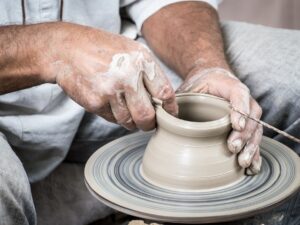It’s Not Always Easy to Know What Time It Is
Meditations on Expendability
By Tarris (Terry) Rosell, DMin, PhD, HEC-C
Rosemary Flanigan Chair in Bioethics

My almost 98-year old father died on a Sunday night, July 28, 2024. His children were all there. We sang hymns and played a recording of the one song he had written years earlier, “Homesick for Heaven.” In the days following Dad’s death, we planned and prepared and executed the usual mourning rituals. Those concluded with a committal service and burial next to Mom in the church cemetery—to which Dad had bequeathed a significant sum of money to ensure mowing and upkeep for years to come.
Then the five of us siblings returned to the farm where we had grown up and where Dad had lived since 1953. In the days and weeks following his funeral, we survivors began to practice the wisdom of an ancient Hebrew poet. The oft-cited verses in Ecclesiastes, chapter 3, states that there is “a time to be born, and a time to die, . . . a time to mourn, and a time to dance.” There also is “a time to get, and a time to lose; a time to keep, and a time to cast away.” Everyone and everything is expendable, it seems. We live and work for a season, and then we’re gone, only to be replaced by others. We keep so many things that are a treasure to us, only to have them thrown out as trash by those who clean up when we’re gone.
I am learning about expendability in various dimensions of life: with my extended family following the loss of our parents, at my places of work in anticipation of retirement some day, and back home in my clay studio also. The unique pot that I had created with diligent care explodes in the bisque kiln, and it is gone. Or a favorite mug on my “keepers” shelf gets knocked off accidentally. So I grieve my creative losses while cleaning up the shards, which are thrown in the trash. Sitting at the wheel sometime later, I recreate. What was lost and cast away is eventually forgotten as other pots take their place on the shelf. They were expendable after all.
A hundred years from now, I too will have been replaced and forgotten. My name will be on the bottom of a few clay pots that survived their creator, but it is very unlikely that anyone who comes across one of my vintage pieces would know who “Tarris” was or anything about me. Probably this will be your fate, also. We all are expendable.
pots that survived their creator, but it is very unlikely that anyone who comes across one of my vintage pieces would know who “Tarris” was or anything about me. Probably this will be your fate, also. We all are expendable.
The writer of Ecclesiastes may well have been clinically depressed when writing his poem. Much art is created in the depths of grief and/or depression. Some of mine is, also. Whatever his state of mind, the poet was both emotive and factual when writing that there is “a time to be born, and a time to die; . . . a time to keep, and a time to cast away.”
During 71 years on the family farm, my father had gotten and kept a lot of stuff. A lot. Dad kept his farmyard like a park. But inside and behind nearly a dozen farm buildings my siblings and I found an overwhelming accumulation of things. Some of it was clearly trash for the 30 cubic yard roll-off dumpster we had rented. It would be full before we were done. Much else that our parents had treasured was nice or even valuable but was nothing that any of their children or grandchildren wished to keep. Those items could be placed on the farm auction that would be held when we were done cleaning up. In the process of sorting, we experienced the expendability of “stuff.” With each new discovery—in the barn and the shed and the garage and the house—we practiced discernment. What time is it for this item? A time to keep or a time to cast away? It’s not always easy to know what time it is.
Whether at the wheel or at the farm, and as I prepare for semi-retirement also, the principle of expendability is made manifest. Like it or not, recognize it or not, “there is a time . . .”
(Excerpted from a book manuscript in progress, tentatively titled, Life Lessons Learned at a Potter’s Wheel)


